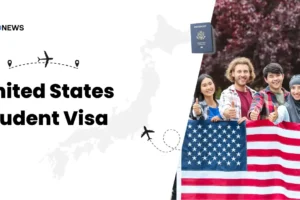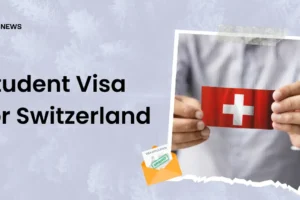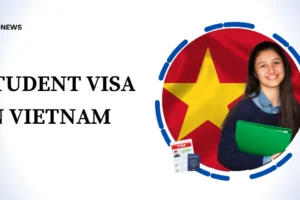If you are thinking about studying in Poland, you need a Poland student visa. Poland has some top-notch universities, and that is why getting into those universities is tough.
Table of Contents
If you are from another country and want to study in Poland, you will need to understand how to get a Poland student visa. This article will tell you all about the process and what documents you need.
In this article, we will learn more about the Poland student visa, its application requirements, visa cost, processing time, and more. Let’s get started.
Key Takeaways
- If you are not from the EU/EEA/Switzerland, you must obtain a student visa from the nearest Polish embassy or consulate before studying in Poland.
- EU/EEA/Swiss nationals can register their stay instead of getting a visa.
- There are two types of visas: Schengen visa (Type C) for short stays up to 90 days and National visa (Type D) for stays longer than 90 days.
- Poland offers a diverse range of courses and universities, with over 450 institutions.
- The country has a high study visa approval rate of 96%.
- Students can choose from various fields like Medicine, Psychology, Computer Science, Law, Business Management, Engineering, Languages, Arts, and Design.
- Students can work part-time while studying, up to 20 hours per week, and full-time during breaks, with a valid residence permit.
- Family members can join students in Poland by applying for a residence permit, allowing them to work and study as well.
- After graduation, students can seek employment in Poland by obtaining a residence permit.
- EU/EEA nationals can extend their permit, while others need to apply for a new one.
- Students have the choice between joining the Polish Health National Fund (NFZ) or opting for private health insurance from local or international providers.
- If the visa application is rejected, applicants can reapply.
Do You Need a Visa to Study in Poland?
If you are not from the EU/EEA/Switzerland, you will need to get a student visa from the nearest Polish embassy or consulate before you come to Poland.
Once you are in Poland, make sure to apply for a temporary residence permit about 45 days before your visa ends so you can stay longer.
But if you are from the EU/EEA or Switzerland and want to study in Poland for more than three months, you just need to register your stay in the country. You don’t need a visa because you have a “laissez-passer.”
Why Should You Apply for a Poland Student Visa?
Here are some of the top reasons why Poland is a great country for students. Let’s have a look at some of these reasons:
- Poland is a top spot for studying abroad because it has many courses and universities to choose from.
- Over 450 higher education institutes offer many different subjects.
- It is a friendly place with people from all over the world.
- There are students from more than 150 countries here.
- Poland has a high success rate of 96% for study visa applications.
- The universities in Poland use the same system as other European countries. This makes it easy if you want to study elsewhere in Europe later.
- The cost of study in Poland is far less when compared to the cost of study in the USA, UK, or other European countries.
The University of Warsaw is one of the best ones here. But there are plenty of other good ones too. If you need help applying, please keep reading, our article will guide you through the whole process.
What Are The Types of Poland Student Visa?
Poland offers two types of visas for students. The first one is called a Schengen visa or Type C visa. It is for short stays of up to 90 days. It allows you to enter Poland multiple times within 180 days.
If you plan to stay longer than 90 days, you will need a Type D Visa. This is also known as a Poland National Visa. This visa is for students who want to stay in Poland for more than 90 days.
To get a Poland National visa, you will need to meet certain requirements and go through an interview process.
Best Courses to study in Poland
Poland has over 500 educational institutions. This includes many public universities where you can study at a low cost. There are also private universities with reasonable fees. Every year, more than 13,000 students from Norway come to Poland for studies.
You have a wide range of courses to choose from. This includes courses such as Medicine, Psychology, Computer Science, Law, and Business Management. Also, there are courses in Engineering, Languages, Arts, Design, and many other subjects.
Intakes in Poland
Poland offers two study periods: summer and winter. You get to pick which one suits you best. Below is a table showing when you can apply and what qualifications you need for each period.
| Higher Study Options | Duration | Intake Months | Deadline to Apply |
| Bachelors | 3-4 Years | Oct (Major) & Mar (Minor) | 6-8 months before the intake month |
| Masters (MS/MBA) | 2 Years |
Where to Apply for a Poland Student Visa?
You can apply for a Poland visa in different places, depending on where you live.
You can go to the Polish embassy or consulate in your own country. If it is nearby, you can visit the one in a neighboring country.
Sometimes, Poland lets other Schengen countries handle visa applications. So you might need to go to their embassy or consulate instead.
If the Polish embassy has hired another company to handle visa applications, you might also be able to apply there.
How To Apply for a Poland Student Visa?
To apply for a Poland student visa, here is what you need to do:
- Find the closest Polish consulate or embassy and schedule an appointment. You can do this online through the Polish Ministry of Foreign Affairs website.
- Next, fill out the application form on the same website where you set up your appointment.
- Gather all the documents you need, like your university acceptance letter. You can find the full list of required documents below in our article.
- Once you have everything, go to the Polish embassy or consulate in person on your appointment date to submit your application.
- Some embassies might ask you to attend an interview to learn more about you.
- Now, wait for their decision. The embassy will let you know how long it will take. This usually takes around 15 days.
Documents Required To Get a Poland Student Visa
To apply for a Poland visa, you will need these documents:
- Fill out two visa application forms online.
- Get two passport-sized photos that meet Poland’s requirements.
- Make sure your passport is valid for at least three months after your planned return date, and bring extra copies of its pages.
- You will also need health insurance to cover you until you set up long-term coverage in Poland.
- Prove you have a place to stay, like dorms or student apartments.
- Show you have enough money to support yourself while in Poland.
- Get an official acceptance letter from the Polish university you are attending.
- Prove your English or Polish language skills with a recent certificate.
- If you have a scholarship, provide documentation to prove it.
- If you are married, submit your marriage certificate.
- Provide your flight details.
- Submit the receipt showing you have paid the visa fee.
How Long Does It Take To Get a Polish Student Visa?
Every country has its own processing time when it comes to student visas. For example Germany student visa has a processing time of minimum 25 days. After you apply for your Poland student visa, it might take about 15 days to process.
Once you have your acceptance letter from the university, it is best to apply for the visa soon. But not more than three months before your classes start.
If you apply in the summer, it might take longer to process your visa.
How Long Can You Stay in Poland With a Poland Student Visa?
With a Schengen visa, you can stay in Poland for up to 3 months. But if you have a national student visa, you can stay for one year.
If you plan to stay longer than three months, you will need to get a Temporary Residence Permit (TRP). When you apply for the permit for the first time, you can stay for an extra two years for your studies.
Please keep in mind, though, that it might take about 8-10 months for your TRP to be processed because every year many people apply for it.
Can You Extend Your Poland Student Visa?
You can make your student visa last as long as your study program. If your visa is ending soon, you can apply for a temporary residence permit to continue studying in Poland.
You can go back to your home country and apply for a new visa. Remember, you cannot extend the temporary residence permit. So you will need to reapply once it ends.
Can You Work in Poland With a Poland Student Visa?
With your student visa in Poland, you can work if you have a residence permit. You can work part-time while studying for 20 hours a week, and full-time during breaks. But please remember, your studies should come first.
It is important to focus on your schoolwork because it affects your visa. If you do not pass your exams or finish your semesters on time, it might make it hard to renew your visa.
Can Your Family Join You in Poland?
If you are studying in Poland and want your family to come too, they can join you by applying for a residence permit.
You need to show that you have enough money to support them during their stay. Your family can also work and study in Poland if you have a temporary residence permit.
How Can You Stay in Poland After You Graduate?
If you want to stay in Poland after finishing your studies, you will need to find a job. To work in Poland, you have to apply for a residence permit.
This permit allows you to live and work in Poland. If you are from an EU/EEA country or Switzerland, you just need to update your permit to stay longer.
How To Get Permanent Residence In Poland After Getting a Poland Student Visa?
If you have been living in Poland with a temporary residence permit for four years straight and have a stable income, you can apply for a permanent residence permit.
This permit lasts for ten years, so every decade, you will need to get a new card. But you won’t have to apply again; it’s just an update.
With the permanent residence permit, you can work in Poland without needing extra permits.
Health Insurance for Students in Poland
As an international student in Poland, you have two options for health insurance: you can either sign up with the Polish Health National Fund (NFZ) or go for a private health insurance company.
If you choose NFZ, you will need your passport, visa or residence permit, and proof of student status from your university. But if you prefer private insurance, you can choose a local or international provider.
What To Do If Your Poland Student Visa Is Rejected?
If your Poland student visa application gets turned down, it might feel disappointing. But don’t worry, this is not over yet.
Common reasons for a rejected application include not showing enough money to support yourself, missing documents, or filling out the form incorrectly.
You can fix these issues by applying again and making sure you include all the necessary information.
If you disagree with the decision, you can write a letter to the consulate explaining why you think they should accept your application.
Poland Student Visa Summary
| Type | Duration | Eligibility |
| Schengen Visa (Type C) | Up to 90 days | Short stays |
| National Visa (Type D) | Over 90 days | Studies exceeding 90 days |
| Document | Description |
| Application Form | Filled online |
| Photos | 2 passport-sized photos |
| Passport | Valid for at least 3 months after return and copies |
| Health Insurance | Valid for your stay |
| Proof of Accommodation | Hostel or apartment reservation |
| Financial Support | Bank statements or sponsor letter |
| University Acceptance Letter | Official document from Polish university |
| Language Proficiency Test | English or Polish test results |
| Additional Documents | Scholarship documents, marriage certificate(if applicable) |
| Application | Processing Timeline |
| Visa Application Review | 15 days |
| Temporary Residence Permit | 8-10 months |
| Extension Type | Description |
| Student Visa | Extendable with a temporary residence permit for studies |
| Temporary Residence Permit | Not extendable, reapply after it ends |
| Health Insurance Option | Description |
| Polish National Health Fund (NFZ) | Public health insurance |
| Private Insurance | Local or international providers |
Frequently Asked Questions
1. Is Poland’s student visa easy to get?
When you want to apply for a visa, go to the closest Polish Consulate. Take the application form and all the required documents with you. It usually takes about 15 to 30 days for them to process your visa. If you are from the EU, you do not need a visa to come to Poland.
2. How much bank balance is needed for a Poland student visa?
To apply for a Poland student visa, you will need to show you have enough money in your bank account. This amount is usually around 13,000 USD. After you apply, it takes about 1 month to get your visa processed.
3. Can you work with a student visa in Poland?
While you are studying in Poland, you can work part-time to help pay for your education. As an international student, you have the right to work if you are enrolled in school. Just make sure you have a valid residency permit if you are not from an EU country.
4. How much money do you need as a student in Poland?
Poland is an affordable country in Europe with a stable economy. As an international student, your living expenses can range from 350 to 550 EUR per month. Depending on where you want to study, you can adjust your budget accordingly. For example, larger cities like Krakow or Warsaw may require you to budget between 500 to 850 EUR per month.
5. Can you travel to Europe with a Poland student visa?
With this visa, you can freely travel to all Schengen countries. Just make sure you do not stay longer than 90 days during its validity.
Conclusion
If you want to study in Poland as an international student, you must have a Poland student visa. Poland has one of the best education systems in Europe. It is known for its quality education.
If you are not from the EU/EEA/Swiss, you will need to get a student visa from the nearest Polish embassy/consulate. Once you are in Poland, you should apply for a temporary residence permit about 45 days before your visa expires to stay longer.












Add Comment